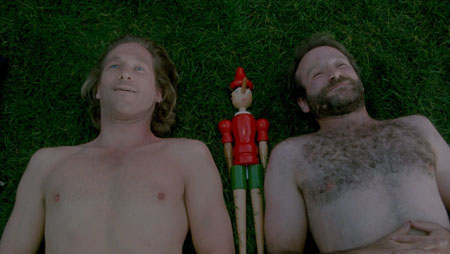
“I LOVE NEW YORK IN
JUNEâ€
By Raymond Benson
I
had seen Terry Gilliam’s The Fisher King only
once, back in 1991 on its initial release, and I liked it very much. As years
went on, though, my memories of it were such that I considered it to be
atypical of Gilliam’s work. For me, he’s always been a hit-and-miss director;
some of his pictures are absolute classics and others not so much. There is a
certain beautiful sloppiness to his direction; to use a painting analogy, it’s
as if he throws a lot of paint on the canvas and maybe it’ll turn out to be
something coherent, funny, and meaningful. Gilliam, I think, is much more of a
visual designer than a people-director—his films always look great, usually very original and envelope-pushing in
their conception and the execution of the visuals. They are often big pictures on large canvases. They
contain lots of effects work, wild costuming, over-the-top performances, and a
frenetic energy that is exhaustive. And
a lot of fantasy.
On
viewing The Criterion Collection’s brand new Blu-ray release of the picture for
the first time since 1991, I now realize that The Fisher King is absolutely not
atypical of Gilliam’s work. I remembered it as being an intimate study of
two characters who go from despondency to finding meaning in their lives, with
not much “Gilliam-esque†aspects to the picture. Whoa, my memory was flawed.
Gilliam’s wildness, his visual extravagance, the over-the-top performances, the
crazy camera angles, fantasy, and the acerbic humor is all there. And it’s
terrific, easily one of Gilliam’s best movies (it’s certainly the one that
received the most Oscar nominations—five, including Best Actor (Robin
Williams), Supporting Actress (Mercedes Ruehl, who won), Original Screenplay (by Richard LaGravenese), Art
Direction/Set Design (of course!), and Original Score.
Jack
Lucas (Jeff Bridges) is a “shock jock†DJ who burns out when one of his
listeners becomes a mass murderer based on something Lucas said on the air. Three
years later he has quit his job, become an alcohol and drug abuser, and hooked
up with video store owner Anne (Mercedes Ruehl in an outstanding performance).
Then he accidentally meets a homeless man named Parry (Robin Williams), whose
wife was killed by that mass murderer in the incident that also wrecked Lucas’
life. Lucas and Parry form an odd couple friendship and Lucas gets the bright
idea of playing matchmaker with Parry and the woman the homeless man dreamily
watches from afar, Lydia (Amanda Plummer).

Parry
suffers from hallucinations (he believes a horrific “Red Knightâ€â€”a fantastic
accomplishment in visual effects and costuming—is after him, and that he must
find the Holy Grail—shades of Monty Python!—in order to bring his sanity back
to earth). Williams delivers one of his wild, crazy-man, wacky performances,
and it’s a gem. Bridges, too, is no slouch and he matches his co-star’s antics
with a grounded portrayal that is the anchor of the piece. One must also
mention Michael Jeter, who almost steals the movie as another homeless man who
does a song and dance in drag that brings down the house.
In
short, The Fisher King may be
Gilliam’s most “humane†picture, for it takes a serious look at homelessness,
mental illness, and the trappings of life that contribute to these ills.
Perhaps that’s why I remembered the movie as being “atypical†of Gilliam... it
had a message of social responsibility and wasn’t some dystopian fantasy set in
another world, although the director’s presentation of New York City certainly places Manhattan in another world!
Criterion’s
new restored 2K digital transfer, approved by Gilliam, looks fabulous, of
course, and the 5.1 surround DTS-HD Master Audio soundtrack is terrific.
There’s an enlightening audio commentary by Gilliam. Other extras include new
interviews with actors Bridges, Ruehl, and Plummer; as well as Gilliam,
producer Lynda Obst, and writer Richard LaGravenese. A new interview with
artists Keith Greco and Vincent Jefferds explores the creation of the Red
Knight. There’s a wonderful video essay of Bridge’s on-set photographs,
narrated by Bridges. Footage from 1991 of Bridges training as a radio
personality with acting coach Stephen Bridgewater is a lot of fun. There are
several deleted scenes with commentary by Gilliam, costume tests, and trailers.
But the most poignant—and absolutely the funniest—extra is a 2006 interview
with Williams discussing the film. An essay by critic Bilge Ebiri completes the
enclosed booklet.
If
you’ve never seen The Fisher King, it
should be high on your list of “to-be-watched†titles. And if you’re a Gilliam
fan, well, it’s a must-have for the collection.